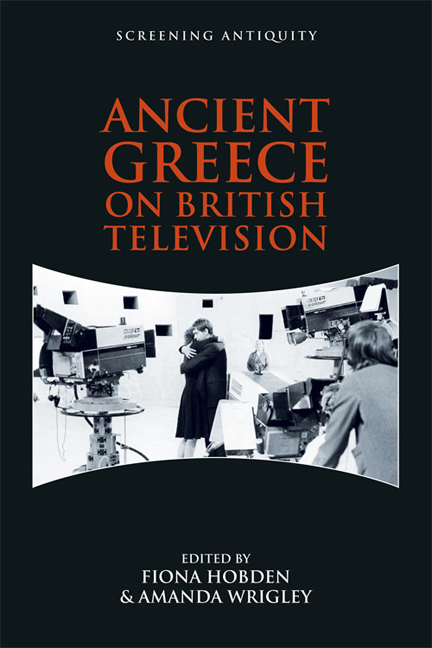Book contents
- Frontmatter
- Contents
- List of Figures and Tables
- Series Editors’ Preface
- Acknowledgements
- Contributors
- Abbreviations
- Broadcasting Greece: An Introduction to Greek Antiquity on the Small Screen
- 1 Are We the Greeks? Understanding Antiquity and Ourselves in Television Documentaries
- 2 Louis MacNeice and ‘The Paragons of Hellas’: Ancient Greece as Radio Propaganda
- 3 The Beginnings of Civilisation: Television Travels to Greece with Mortimer Wheeler and Compton Mackenzie
- 4 Tragedy for Teens: Ancient Greek Tragedy on BBC and ITV Schools Television in the 1960s
- 5 The Serpent Son (1979): A Science Fiction Aesthetic?
- 6 Don Taylor, the ‘Old-Fashioned Populist’? The Theban Plays (1986) and Iphigenia at Aulis (1990): Production Choices and Audience Responses
- 7 The Odyssey in the ‘Broom Cupboard’: Ulysses 31 and Odysseus: The Greatest Hero of Them All on Children’s BBC, 1985–1986
- 8 Greek Myth in the Whoniverse
- 9 The Digital Aesthetic in ‘Atlantis: The Evidence’ (2010)
- 10 Greece in the Making: From Intention to Practicalities in Television Documentaries. A Conversation with Michael Scott and David Wilson
- Bibliography
- Index
Broadcasting Greece: An Introduction to Greek Antiquity on the Small Screen
Published online by Cambridge University Press: 24 April 2021
- Frontmatter
- Contents
- List of Figures and Tables
- Series Editors’ Preface
- Acknowledgements
- Contributors
- Abbreviations
- Broadcasting Greece: An Introduction to Greek Antiquity on the Small Screen
- 1 Are We the Greeks? Understanding Antiquity and Ourselves in Television Documentaries
- 2 Louis MacNeice and ‘The Paragons of Hellas’: Ancient Greece as Radio Propaganda
- 3 The Beginnings of Civilisation: Television Travels to Greece with Mortimer Wheeler and Compton Mackenzie
- 4 Tragedy for Teens: Ancient Greek Tragedy on BBC and ITV Schools Television in the 1960s
- 5 The Serpent Son (1979): A Science Fiction Aesthetic?
- 6 Don Taylor, the ‘Old-Fashioned Populist’? The Theban Plays (1986) and Iphigenia at Aulis (1990): Production Choices and Audience Responses
- 7 The Odyssey in the ‘Broom Cupboard’: Ulysses 31 and Odysseus: The Greatest Hero of Them All on Children’s BBC, 1985–1986
- 8 Greek Myth in the Whoniverse
- 9 The Digital Aesthetic in ‘Atlantis: The Evidence’ (2010)
- 10 Greece in the Making: From Intention to Practicalities in Television Documentaries. A Conversation with Michael Scott and David Wilson
- Bibliography
- Index
Summary
At 10.25pm on Sunday 14 November 1965, the British television viewer had three options. Coming to the end of that year's Royal Variety Performance they may have been gearing up to watch the US sitcom Beverly Hillbillies on ITV, the Independent Television network, or to enjoy the wit and repartee of Frank Muir and his guests in the wordbased game show Call My Bluff on BBC, the British Broadcasting Corporation's second television channel, which had been instituted the previous year. Then again, they may have stayed with BBC following the end of a 40-minute excerpt from the Magic Circle's Annual Show, broadcast from London's La Scala Theatre, for The Drinking Party. This ‘Sunday Night’ feature by Leo Aylen and Jonathan Miller was billed as ‘a modern recreation’ of an ancient Greek philosophical text, Plato's Symposium. Within the wider schedule of light entertainment this evening, The Drinking Party stands out as a serious-minded, if not entirely sober affair. Although antiquity came late to the television screen by comparison with its sister medium radio, which had since the 1920s drawn on ancient Greece and Rome for programme material, from the late 1950s ancient Greece has offered a creative source of inspiration and content for the medium. Today it may be difficult to imagine a dramatisation of a Platonic dialogue being afforded prime position in the schedule of the principal public service channel, but ancient Greek culture, politics, archaeology, literature, mythology and thought have regularly appeared in British television schedules in various forms to the present day.
It is the purpose of this book to examine television's engagements with ancient Greece across these decades. As the first book-length study of this topic, it cannot be exhaustive. Yet, as a collaborative and cross-disciplinary endeavour that capitalises upon the expertise of researchers with backgrounds in Classics, Ancient History, Classical Reception Studies, English, Media Studies, Cultural History and Digital Humanities, as well as television practitioners, it captures something of the scope, diversity and texture of ancient Greece on television. Rather than attempt a catalogue of Greek-themed programming, which would be of limited critical value, each of the chapters drills down into specific examples of different genres, combining close analysis of individual television programmes, production contexts and (where possible) audience engagement.
- Type
- Chapter
- Information
- Ancient Greece on British Television , pp. 1 - 23Publisher: Edinburgh University PressPrint publication year: 2018



